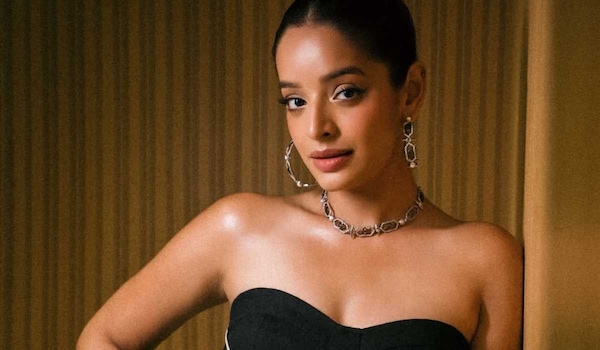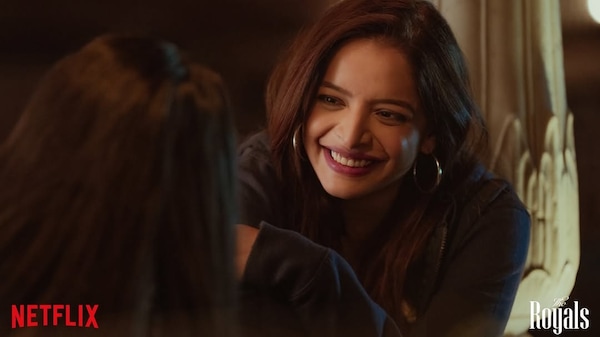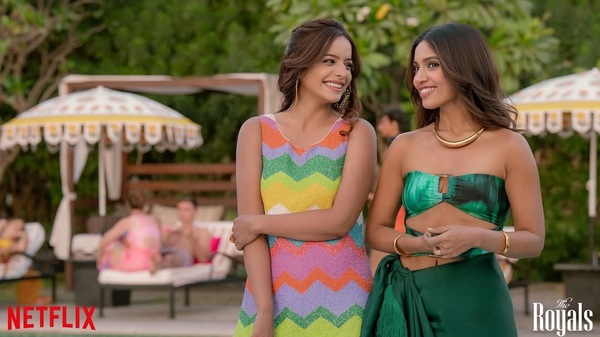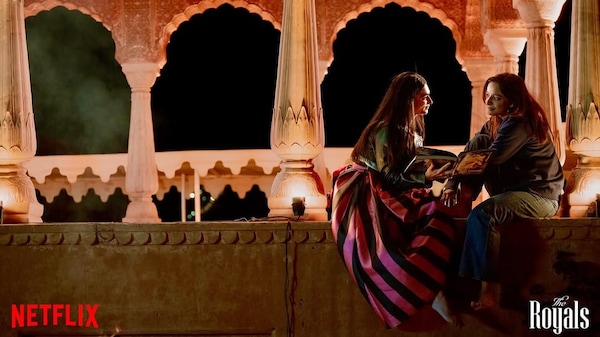The Royals actor Lisa Mishra: 'Don’t want to be known as a token musician who happens to act on the side' | Exclusive
Lisa Mishra transitions from acclaimed singer to actor with strong roles in Call Me Bae and The Royals, embracing vulnerability, complex characters, and a promising multi-faceted career ahead.

Last Updated: 05.10 PM, May 20, 2025
Lisa Mishra is steadily carving out her space on screen—one compelling performance at a time. After making a confident acting debut with Call Me Bae, the acclaimed singer-songwriter returns to the spotlight with her second on-screen outing in The Royals. Known for her stirring vocals in hits like Tareefan, Mishra now continues her exploration of storytelling through a new medium. In The Royals, she plays Niki Kaushik—a character that allows her to tap into both vulnerability and quiet strength. In this exclusive interview with OTTplay, Mishra reflects on bridging the worlds of music and acting, why this role felt personal, and how she’s learning to embrace the reinvention that comes with each performance.
Edited excerpts...
Your fans know you as a soulful singer-songwriter. How does it feel to now be seen as an actor?
It feels really good. I feel like I thought I would be good at this thing, and I don't want to be known as a token musician who happens to act on the side. It feels really satisfying that people are recognising me for acting, which was the intention. I didn't want to just be a musician who was called in to do one small thing as a cameo or something. So it feels really, really nice.

You've made such a strong impression in your debut roles. What inspired the shift from music to acting?
I think somewhere I always knew I wanted to do this because I've been an entertainer for such a long time, so it wasn't so foreign to me to now do what I do on stage on screen. I like entertaining. I like making people feel things and stir up their emotions as a musician. So it feels very natural for me to be able to do this on screen now, and it's been a blessing the transitions. And mostly, I think the blessing is to be able to work alongside people you've admired for so long.
In The Royals, you play this headstrong, creative designer, but there are so many underlying aspects about your character. I liked the supporting characters' arcs, especially yours, because your character's sexuality is just part of it, as it should be. We don't need to put a label on it...
I am glad you said that. Yeah, that was the intention. We wanted to do it that way.
In The Royals, you play Niki Kaushik, a headstrong and creative designer. What drew you to her as a character?
I think when I read the script, I knew I really wanted to play this part because I saw some major overlap with me as a person and in Nikki's sexuality and everything. I thought she was an empowered, young, self-made woman, and she exists in a world of her making, and she has agency. She calls the shots in her life, which I think is incredible, and she has this insanely close bond with her best friend. And it was really exciting for me to see some female friendships portrayed under scrutiny when I first read the script. I think that the initial attraction was to that because we rarely. We have lots of bromances. We have girls fighting over each other for male attention, but we don't get to see so many women as friends on screen. Yeah, and that was a very, very big attraction point for me. I wanted to be in that space. I wanted to do justice for that part of it.
The show explores themes of women reclaiming power. How did those themes resonate with you personally and emotionally prepare to portray her?
I think the preparation was my life experiences. I moved to... like Nikki has a life in Bombay in an apartment that she owns; she pays the rent. There, she lives there; she pays her bills. That's who I am in real life.

Can you take us back to the moment you first found out you'd landed your role in The Royals? What was your first reaction?
I was on stage. Actually, I was performing. I was at a show in Mumbai at MMRDA, and I was finishing up on stage, and I got a call from my casting director, and whenever she calls, I immediately take the call, but obviously I couldn't, so I handed the phone to my manager, and when I was getting off stage, she was like, They have offered you this role, and it was my dream role. I auditioned six times, I think, for this. I went through a very rigorous audition process, and it took a while for them to land every single person that they wanted on this show, but I'd already been told that, you know, Ishaan would be in it, Bhumi would be in it, and Sakshi Tanwar and Zeenat Aman would be in it. So obviously that was one big draw to it. And the other was just that this is a multidimensional, fully fleshed-out character, and I would get to play all these different arcs. I have a romantic arc, I have a best friend, I have a work life, and it was just so so attractive on paper that she isn't a trope. She isn't just the best friend or just the comedic relief or whatever. I really like that she has a lot of complexity. And I got off stage and I could not have given a faster.
The Royals has been helmed by Priyanka Ghose (Broken But Beautiful) and Nupur Asthana (Hip Hip Hurray, Romil & Jugal).
What was the most emotionally intense or creatively fulfilling scene for you in The Royals?
I think the most emotionally intense one was my rejection from Jinnie (Kavya Trehan). Where she sort of friend zones me and I was under the impression that we were going to go on a date together. That was really – I mean, I just thought about all the different times I've been rejected. Because I don't like using glycerine, I like crying. So real tears and real emotion were brought into that scene, and I was very happy that it came across that way on screen. I was excited to do that part, that of the script, but it was also definitely the most challenging kind of landing that emotion and then quickly moving on because we shot these scenes back to back, my rejection and walking into the room and having Sophia there to tell me that she's my forever date. I love that it was very hard to pull off, but also it was authentic because I've been in that place before.
Was there any fear of not being taken seriously as an actor because of your music background?
Totally, I think the frequency of the notion is actually a thing in India more than anywhere else because we have so many instances of musician-actors now all over the world. We have Ariana Grande in Wicked, and Lisa from BlackPink was in The White Lotus just now. We have Lady Gaga; that's the best example of someone who's done this on both sides of the screen. I think in India, we're just getting used to, or starting to get used to, multi-hyphenates. I definitely wanted to come onto that set and prove my worth, not only because it was important to me to be recognised as an actor, not just a musician who happened to act on the side, but also because I didn't want to waste anyone's time who were so senior and respected in the industry. I didn't want to come in and waste the time of somebody as highly regarded as Bhumi Pednekar or Ishaan Khatter or, of course, Zeenat Aman and Sakshi Tanwar, and everyone on that set has much more experience than I do with all of that. I was definitely the youngest in terms of experience on screen. And I just didn't want to dishonour the privilege of being on that set, so it was important to me, for sure, to be taken seriously and not just seen as a musician.
How did you prepare differently for Harleen in Call Me Bae versus Nikki in The Royals?
I think Harleen has to be who she is because she is the boss. It's kind of what Sofia's (Bhumi Pednekar) character is in the world as well. She can't reveal everything because she has employees. She has her work life. She has all these people that depend on her. So when you're playing a character like Harleen, you can't be so confrontational because you're taking care of so many other aspects of your life. Nikki has the space to be more upfront because she has a boss. She's unanswerable to the same set of complexities as her character is. And also, I think it adds a little more humour and nuance to Nikki; I can do a little more masti on screen with my best friend. I can have a more relaxed sort of outlook on life. And it was really fun to sort of flex that light comedy side of me and pull on my best friend all the time and make fun of her when she messes up or she does something stupid, and vice versa. I'm really excited for people to continue seeing this friendship that we developed on and off screen, because it was very authentic. That is exactly how we were in real life. I think Nikki is definitely like the younger version of Harleen. Harleen is who Nikki evolved into.
How do you manage vulnerability in both music and acting—do they challenge you in similar ways?
I think musical vulnerability is really different because I'm the creator. So when you're listening to a song of mine, those are my actual emotions as Lisa Mishra, so those are my words. Those are my compositions and that's my delivery. When you see me on stage and I'm giving you an emotion, it's as real as it gets, because it's my actual life up for grabs. On screen, someone else is directing you, someone else has written this part, and someone else is lighting you and doing your hair and makeup. You're in another person's world, and your job is to deliver their vision. And I think being vulnerable in music is as close to the real person as it gets. Being vulnerable on screen is as close to the character and what's expected of you. So they're authentic in different ways. One is authentic to me, the person; the other one is authentic to the vision of the creators. And you just have to balance and figure out how much of yourself you can bring into the role as an actor and how much you should leave, because you're not always going to be playing a Nikki. Your next role could be something completely foreign to you as a person. I mean, the great challenge of being an actor is being adaptable and malleable. So I hope the next time I do something that vulnerability comes from lots of prep and lots of understanding who I'm playing.
Has this chapter changed your definition of what success means to you?
I think success has always meant the same. To me, it's just leading a fulfilled life and remaining very true to your close relationships. If you're as successful as you are loved, and that's about it, loved by people who know you closely. So just needing a good person, and life will give you plenty in return.

You've been part of the industry for nearly seven years now—from your breakout with Tareefan to singing for major films, debuting as an actor with a Karan Johar production, and now working with icons like Zeenat Aman and Bhumi Pednekar. When you look back, how would you sum up your journey so far?
It's been a dream. It's been a dream run, I think it goes without saying. How many people get to live the life that I do and in the way that I've been able to continue evolving? Very few people will have that story, and every day, I just have immense gratitude for what I've been given in this life, and I also look at it as a responsibility to honour what I've been given and continue growing and being a good person and not getting ahead of myself and not getting an ego about any of this. Now, I think what the next phase of my life will be is working hard to prove that I deserve all these things, because it shouldn't look like I got lucky, and I don't want anyone to think it's because I got lucky, because I got lucky, because this journey has been very long and very arduous as a musician. I wasn't recognised for my work until 11 years into releasing music and even longer since I started making music and then it took 11 years for me to be discovered as a musician. It took five years after that for me to land my first acting gig after many failed auditions, and it's going to be more of that. You're always chasing your next big thing. You're always going to face a lot of rejection along the way. And it's important for me to let people know that life is not just like this linear progression; these big moments happen. They're few and far between, but when they do, it's the universe calling to you to level up and do better and work harder. So that's the only model I have: just keep working very hard and keep pouring myself into acting and making sure that I don't take it for granted, definitely.
So what's next for Lisa Mishra?
I don't know yet. I think now we get back into the auditioning phase of life, but we have Season Two of Call Me Bae that's coming soon. Then hopefully we hear about a season two of The Royals very soon as well. If we're lucky, we'll hear soon, because I think they announced that we were getting a season two just weeks after Call Me Bae. So if we're lucky, we see the same news coming out of The Royals, let's hope. But in between, I am going to just keep auditioning and keep showing up and letting people know that I am here, and please cast me. As a musician, my next music is coming out in a couple of weeks, and this whole year is about big love songs and ballads and going back to the things that people have really fallen in love with that I have given them. For the Tareefan and Sajna Ve lovers, this is going to be a year kind of like that.
Subscribe to our newsletter for top content, delivered fast.
